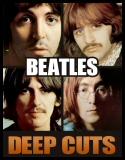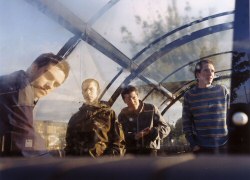
Catching up with Richard Archer of Hard-Fi
03/27/2006
Music Home / Entertainment Channel / Bullz-Eye Home
ALSO: See David's review of Hard-Fi's new disc, Stars of CCTV.
When last we spoke with Richard Archer, he and his fab band Hard-Fi were doing the festival circuit with only an EP (Cash Machine) on the US shelves. At last, the American public is blessed with the arrival of Stars of CCTV, an even more super-fab blend of Clash and Specials-style reggae with such modern-day upstarts as Blur and Daft Punk. Bullz-Eye’s resident Hard-Fi aficionado caught up with lead singer Richard Archer once again to talk about the last nine months of his life, which includes a #1 record, losing his mum, and jamming with the Specials. And get this: they had to teach the Specials the chords to their own songs. Read on….
Bullz-Eye: Richard, how are you?
Richard Archer: Alright, man, how are you?
BE: Good, good. Where are you right now?
RA: We just rolled into St. Petersburg. Florida, not Russia. That would have been a major, major wrong turn. We’ve got a gig tonight, and fortunately, it’s sunny.
BE: You’re at least down south this time of year, so that’s nice.
RA: Yeah, yeah.
BE: Last time we spoke, you said that your routine was “play the gig, bus. Play the gig, bus.” Are you getting a chance to walk around a little and see more of the country this time around?
RA: Uh, no. Well, generally, it’s like this: eat, play the gig, bus. Eat, play the gig, bus. Food, strangely, consumes you. Whatever you do, it’s about trying to find some decent food. We’re only at the start of this tour, and we did the first show at South Padre Island. And we had to drive for 24 hours, most of it at night. So there’s obviously not a lot to look at out the window, which is a shame.
BE: Does it seem weird to still be promoting an album that you finished years ago?
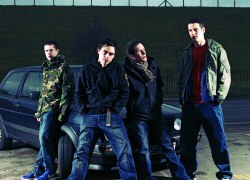 RA: It is, a bit. Not so much that we finished it a while ago, but it came out here last week, in the middle of March, and it came out in the UK last July. It’s hard, because a lot of people already bought it on import, but you’re starting again, really. The weirdest thing was prior to that, doing gigs when you didn’t have an album to promote. At least now, people can get a hold of it, and listen to it. So yeah, it is a bit strange, but trying to promote an album around the world at the same time is going to wipe you out, which is what it’s been like for us. We have our first week off in June, since, like, September. And that week’s already getting filled with French shows. So it’s good to be that busy – you know, that people want me – it just means that you don’t have any social life apart from the band.
RA: It is, a bit. Not so much that we finished it a while ago, but it came out here last week, in the middle of March, and it came out in the UK last July. It’s hard, because a lot of people already bought it on import, but you’re starting again, really. The weirdest thing was prior to that, doing gigs when you didn’t have an album to promote. At least now, people can get a hold of it, and listen to it. So yeah, it is a bit strange, but trying to promote an album around the world at the same time is going to wipe you out, which is what it’s been like for us. We have our first week off in June, since, like, September. And that week’s already getting filled with French shows. So it’s good to be that busy – you know, that people want me – it just means that you don’t have any social life apart from the band.
BE: The last time you and I talked, I only had a copy of the (Cash Machine) EP. Now that I’ve heard the record and read the press release, they make a comparison between “Hard to Beat” and (the single by Daft Punk offshoot Stardust) “Music Sounds Better with You,” and I have to say I couldn’t agree more. Was that intentional?
RA: Um, yes, and no. It was intentional in that we listen to a lot of that French house music, you know, Daft Punk, Stardust…but it wasn’t like, “Let’s try to make this to be the indie “Music Sounds Better with You.” We just said, “I like that, I like the sound of those records!” Originally (“Hard to Beat”) was kind of written as a house track. So subconsciously, you could say yeah, it was intentional, but it’s not like we sat down and said “Let’s write a number that sounds like…” To me, I never saw a problem with, you know, I’d sit down and listen to Stardust and Daft Punk, and dance to it in a club. But then I’d also listen to Nirvana, or whatever.
BE: What did you think of the last Daft Punk record (Human After All)?
RA: Um, I prefer the one before that (Discovery). But there were some interesting bits on Human After All. For once, people were making dance music that was kind of soulful as well, and it was like the earlier stuff from Chicago, and you could actually relate to it. It wasn’t just a mechanical thing just to give you a beat.
BE: The reason I asked is because I thought Discovery is one of the greatest records of the decade, and I was really disappointed with the last one. I felt like they phoned it in.
RA: If you listen to a lot of those acts from that era…I mean Air kind of did it as well. There’s that blinding first flash, and then after that, you imagine that they have to get back into the studio, and pound something out in about two months, after they had all that time to perfect what they were doing.
BE: I agree with you wholeheartedly on the Air comparison, I didn’t like (10,000 Hz Legend) at all. They made up for it with the next record (Talkie Walkie), though.
RA: Yeah, yeah.
BE: Speaking of “Hard to Beat,” do my ears deceive me, or was the album remixed for the US release?
RA: Uhhhhh…? No.
BE: It sounded different to me. I got a copy of the import version of Stars of CCTV, and “Hard to Beat” in particular sounds a lot different.
RA: We just remixed “Hard to Beat” for American radio, but they literally just sent me an .mp3 of it from a studio in England. It was done yesterday. I don’t know what (version) you have, because we had released a mini-album ourselves, and we did remix “Hard to Beat” from that, for the UK album. So you never know which version appeared on what. But the one on the US album is the same as (the one on) the UK.
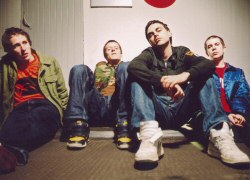 BE: Okay, true or false: “Tied Up Too Tight” is a tribute to The Great Escape from Blur.
BE: Okay, true or false: “Tied Up Too Tight” is a tribute to The Great Escape from Blur.
RA: Heh heh. Well, it was kind of a tribute to The Great Escape, but…it was kind of two things: one was the express journey from Staines to London. Also, it was kind of like a call to arms for the band; where I come from, it’s like, “straight out of West London like a loaded gun,” not that we advocate gun use, but it’s like a message to the music industry, that you have to take notice of us, whether you like it or not. We always thought that we wouldn’t be embraced by the cool, music elite, so that they would have to take notice of us.
BE: Have you started working on new material?
RA: The first album worked out in that we recorded it at the stage where we were just trying to get this seven-track mini album out. At first, we released it ourselves. Everything took ages. Someone said they’d master it for us. We sent the stuff to them. Seven weeks later, they hadn’t done it, because they just got so busy, so then we had to do it ourselves, but first we had to learn how to do it, and borrow some equipment. Our distribution company went bust just as (the album) was about to be released, so then we had to find another (distributor), etc., etc. All this stuff that went wrong. So the nine, ten months before it came out, all that time, I was writing. And it was a really frustrating time, because here’s this thing you’ve been busting your balls on for what seems like forever, and you’re running out of money, you’re running out of the will to carry on, and keep going. But all that time, I was writing. And I’ve got 30 to 35 songs around that will make up the bulk of the second album. So even though I haven’t written as much recently, I’m really just trying to look at that stuff that we’ve already got, and develop those.
BE: Is there a particular song from Stars of CCTV that serves as the new album’s jumping-off point?
RA: I don’t know, because the stuff I’ve written is all quite varied. It all depends on what (songs) we choose, in how the next album will sound. What I really want is the opportunity to go inside the rehearsal studio and actually sit down and go, “Look, let’s try this one in 3/4 (time). Let’s try this one on the marimba." I feel like most of them sound like shit. But occasionally, something sounds amazing, and the rehearsal is the trial for a lot of stuff. So until we get in there, it’ll be hard to kind of gauge (which direction the album goes). I think that the second album, a lot has happened to me since (Stars of CCTV). My long-term relationship broke up. I lost my mother. And I think this album will reflect it. I lost my mom in June of last year, the day before our first Top Ten record.
BE: Are you still in Staines?
RA: Yes.
BE: Does the view look a little different now that you’ve had a taste of success?
RA: Um, the weird thing is you go away, you get on the plane, and you go to New York, and you go to Detroit, and you go to the Motown Museum. Then you go to Los Angeles, all these amazing places. Then you get back to Staines, and you walk in the pub, and it’s like you never left. The guys are like, “What’s up, mate?” And you’re like, “Hey, nothin’.” One of the funniest things is that one of the pubs has had kind of a rebirth, and they’ve asked me to open it. (chuckles) They’ve asked me to come down and cut the ribbon on the rebirth of the new pub, which I think is hilarious.
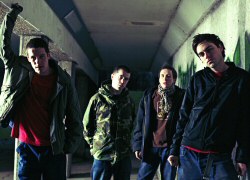 BE: So you’re like the new mayor of Staines?
BE: So you’re like the new mayor of Staines?
RA: The mayor will be there.
BE: He’s going to be there, and you’re cutting the ribbon?
RA: Yeah! (laughs)
BE: I love it. That’s awesome. Well, what is the biggest thing that’s happened to you since we talked last summer? We talked right after Lollapalooza.
RA: Well, when the album went to #1 in the UK, that was a real big deal. You always dream about that when you’re a kid. We worked with an organization in London called Love Music Hate Racism, which is a modern-day equivalent of the Rock Against Racism of the late ‘70s and early ‘80s. And the last show the Specials did was for Rock Against Racism, they played “Ghost Town.” So we kind of sorted it out, that if we could get Jerry Dammers and Neville Staples onstage with us, we’d play “Ghost Town” with them. Which was a huge moment for us. Actually, Terry Hall was there, and he and Jerry were talking about getting onstage with us for the first time in 21 years, and we’re like, “Come on, do it, do it, do it!” And they’re like, “Well, we haven’t rehearsed!” But we did a rehearsal with Jerry Dammers, and he’s like, “I don’t remember the chords!” So we had to show him the chords to “Ghost Town.” That was a really cool moment.
BE: Wow, that’s like being touched by the hand of God.
RA: Yeah, we got a great picture of us onstage on my wall at home.
BE: What other bands have you been listening to lately? What are you playing on the bus?
RA: The Gorillaz album.
BE: You mentioned that last year.
RA: Yeah, yeah, that and a lot of Interpol, maybe 50/50. That and a lot of early KRS-One stuff. We have to catch up on all that, really, the stuff that you have on vinyl, and you realize that you haven’t listened to it in three years. It’s hard to hear some of the newer bands, we’ve been trying to get (people) to send us stuff. We’re actually trying to get Billy Bragg. But yeah, a lot of varied stuff, not a lot of newer stuff.
BE: I’m privileged in that I’m getting all this great, great British stuff sent to me.
RA: Like what?
BE: Like Editors, Arctic Monkeys. These are probably things that have been out in England for months or years. They finally dropped Destroy Rock ‘n Roll from Mylo in the States.
RA: Yeah.
BE: You probably heard that years ago.
RA: He actually had to release that at first on his own label, so it’s been out for a while now.
BE: That new Delays record…the song “Valentine” is one of the greatest songs I’ve heard in a long time.
RA: Aw, yeah? I haven’t heard that.
BE: Well, I’m sure we’re running out of time (looking at the clock on the phone), we’ve been on the phone nearly 25 minutes! I should keep you on schedule, but I appreciate you taking the time to chat with us again.
RA: Oh, my pleasure, man!








